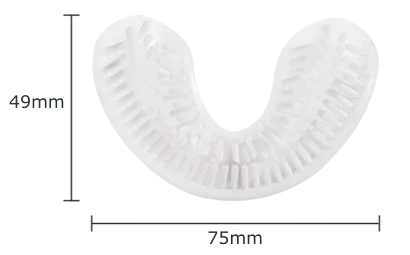
Does Brushing Your Tongue Help with Bad Breath?
Bad breath, or halitosis, is a common concern that many people face. It can be embarrassing and affect our confidence in social situations. But what if the solution is simpler than we think? What if it’s all about a part of our mouth we often overlook? That’s right—the tongue.
What Causes Bad Breath?
Halitosis is more than just “morning breath.” It’s a persistent problem for many. Bad breath can be caused by anything from food particles left behind in the mouth to more serious health issues.
When bacteria in your mouth break down food, they produce compounds that smell bad. Without regular cleaning, these bacteria multiply, making the problem worse.
Your tongue is a major culprit in bad breath. Its surface has tiny grooves that trap bacteria and food particles. This creates a perfect environment for bad smells.
Ignoring your tongue in your daily oral care means missing a key source of bad breath. Cleaning it should be just as important as brushing your teeth.
How Brushing Your Tongue Can Help
Brushing your tongue can effectively reduce the bacteria that cause bad breath. This simple step can make a big difference in your breath's freshness. By brushing your tongue, you'll:
- Remove bacteria and food particles.
- Promote a healthier tongue.
- Improve your breath and overall oral health.
- Gain confidence in social situations.
Make it a habit to brush your tongue, and over time, you'll likely notice a significant improvement in your breath.
The Right Way to Brush Your Tongue
To get the most out of brushing your tongue, it's important to do it correctly. Use a soft-bristled toothbrush to avoid irritating your tongue. Brush gently from the back of your tongue toward the tip. Be sure to clean both the center and the sides of your tongue. After brushing, rinse with water to wash away any loosened debris.
Consistency is key. Brushing your tongue every day will help keep your mouth fresh and clean.
Tongue Scraping: A Good Alternative?
If brushing isn’t your thing, tongue scraping is another effective option. This involves using a special tool to scrape debris off your tongue. Many people find that tongue scrapers can clean spots a toothbrush misses.
To use a tongue scraper, gently place it at the back of your tongue and pull it forward. Repeat this a few times for a thorough clean. Both brushing and scraping are great ways to improve your oral hygiene.
For an Effortless Clean: The autobrush® Automatic Tongue Scraper
For a more efficient and easy experience, consider incorporating the autobrush® Automatic Tongue Scraper into your routine. This tool clicks into the u-shaped toothbrush base, and uses gentle electric vibrations to clean your tongue. It removes bacteria and food particles, giving you a fresher mouth with less effort. It's an effortless way to improve your oral hygiene and maintain fresh breath every day.
Other Tips for Fresh Breath
Brushing your tongue is important, but combining it with other habits can help keep your breath fresh all day. Here are a few more tips to prevent bad breath:
- Drink plenty of water to stay hydrated and encourage saliva production.
- Avoid alcohol and coffee, which can dry out your mouth.
- Visit the dentist regularly for check-ups and cleanings.
- Use a non-alcoholic mouthwash to freshen your breath.
- Chew sugar-free gum to stimulate saliva flow.
- Eat crunchy fruits and veggies to help clean your teeth naturally.
When to See a Doctor
If bad breath persists despite your best efforts, it may be time to see a dentist. Ongoing halitosis could indicate dental issues like gum disease or cavities. In some cases, it might point to larger health problems such as diabetes or sinus infections.
A healthcare professional can help identify the cause of your bad breath and offer tailored treatments.
The Impact of Fresh Breath
Fresh breath isn’t just about good hygiene—it can improve your confidence and social life. Bad breath can make you feel self-conscious, causing you to shy away from conversations and social situations.
When your breath is fresh, you feel more confident, which can strengthen both personal and professional relationships. People also tend to associate good breath with good hygiene, which can help you make a positive impression.
Conclusion
Brushing your tongue is a simple but powerful way to combat bad breath. It’s an easy addition to your daily routine that can have a big impact on your oral health and confidence. You can keep your breath fresh and maintain a healthier mouth. To do this, combine tongue brushing with other oral hygiene habits. Also, make sure to visit your dentist regularly.












